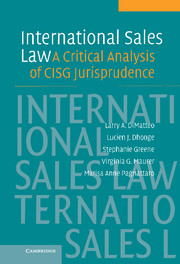Book contents
- Frontmatter
- Contents
- Preface
- Acknowledgments
- 1 INTRODUCTION
- 2 CISG METHODOLOGY AND JURISPRUDENCE
- 3 FORMATION: WRITING REQUIREMENTS
- 4 FORMATION: OFFER AND ACCEPTANCE RULES
- 5 OBLIGATIONS OF BUYERS
- 6 OBLIGATIONS OF SELLERS
- 7 COMMON OBLIGATIONS OF BUYERS AND SELLERS
- 8 BREACH OF CONTRACT BY SELLER
- 9 BREACH OF CONTRACT BY BUYER
- 10 DAMAGES, EXCUSE, AND PRESERVATION
- 11 SUMMARY AND OBSERVATIONS
- TABLE OF AUTHORITIES AND CASES
- APPENDIX A: UNITED NATIONS CONVENTION ON CONTRACTS FOR THE INTERNATIONAL SALE OF GOODS (CISG) (APRIL 11, 1980)
- APPENDIX B: CISG: TABLE OF CONTRACTING STATES (AS OF FEBRUARY 8, 2005)
- Index
7 - COMMON OBLIGATIONS OF BUYERS AND SELLERS
Published online by Cambridge University Press: 06 August 2009
- Frontmatter
- Contents
- Preface
- Acknowledgments
- 1 INTRODUCTION
- 2 CISG METHODOLOGY AND JURISPRUDENCE
- 3 FORMATION: WRITING REQUIREMENTS
- 4 FORMATION: OFFER AND ACCEPTANCE RULES
- 5 OBLIGATIONS OF BUYERS
- 6 OBLIGATIONS OF SELLERS
- 7 COMMON OBLIGATIONS OF BUYERS AND SELLERS
- 8 BREACH OF CONTRACT BY SELLER
- 9 BREACH OF CONTRACT BY BUYER
- 10 DAMAGES, EXCUSE, AND PRESERVATION
- 11 SUMMARY AND OBSERVATIONS
- TABLE OF AUTHORITIES AND CASES
- APPENDIX A: UNITED NATIONS CONVENTION ON CONTRACTS FOR THE INTERNATIONAL SALE OF GOODS (CISG) (APRIL 11, 1980)
- APPENDIX B: CISG: TABLE OF CONTRACTING STATES (AS OF FEBRUARY 8, 2005)
- Index
Summary
This chapter focuses on the common obligations of buyers and sellers under the CISG. These common obligations and concepts pertain to the passing of risk, fundamental breach, anticipatory breach, and adequate assurance. The first section reviews the passing of risk, which is the subject of a separate chapter of the CISG. Common Obligations is found in Chapter V of the CISG. It includes six sections: Section I, anticipatory breach and installment contracts; Section II, damages; Section III, interest; Section IV, exemptions; Section V, effects of avoidance; and Section VI, preservation of goods. Section I's coverage of anticipatory breach will be examined in the present chapter. Section II (damages), Section IV (impediment), and Section VI (preservation) will be examined in Chapter 10. Avoidance (Section V) will be examined along with the nachfrist notice in Chapter 9.
PASSING OF RISK
The CISG sets forth the basic principle for the passing of risk in Article 67. A pivotal issue for determining risk is where the contract requires the seller to hand over the goods. If the seller is not bound to hand over the goods at a particular place, the risk passes to the buyer when the goods are handed over to the first carrier for transmission to the buyer. If, however, the seller is bound to hand over the goods to a carrier at a particular place, the risk does not pass to the buyer until the goods are handed over to the carrier at that place.
- Type
- Chapter
- Information
- International Sales LawA Critical Analysis of CISG Jurisprudence, pp. 121 - 131Publisher: Cambridge University PressPrint publication year: 2005

